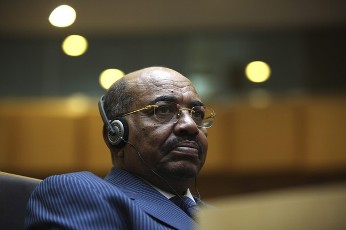Sudan doubts reports on Interpol requesting arrest of Bashir at Baghdad summit
March 13, 2012 (WASHINGTON) – The Sudanese government expressed scepticism about the authenticity of remarks attributed to an unidentified Iraqi official who said that they received a request from the International Criminal Police Organisation (INTERPOL) to arrest president Omar Hassan al-Bashir should he attend the Arab League summit in Baghdad later this month.

“According to Interpol and the agreements concluded with Iraq, it has the right to implement the arrest warrants issued by the international courts in Iraq,” the official said.
The summit, which will start on 29 March, will be the first non emergency meeting of the 22 nation body to be held in violence-racked Baghdad in more than 30 years.
Sudan confirmed it will take part in the summit but has yet to decide at what level.
In an interview with the Qatar-based Al-Raya newspaper published last Sunday, the Sudanese president described the situation in Iraq as “non-assuring” when asked about attending.
“[T]he Iraqi government is [operating from] inside the Green Zone surrounded by concrete walls and this is neither a comfortable situation nor an ideal one” Bashir said.
“We support peace in Iraq, we support unity in Iraq, we are worried about Iraq but we are not happy with the situation in Iraq. So far we have not made a decision to participate in the Arab summit. This will be decided by the pertinent [government] bodies in Sudan”, the Sudanese president said.
Bashir maintains the status as the first head of state to be indicted by the International Criminal Court (ICC) on charges of orchestrating war crimes, crimes against humanity and genocide in Sudan’s western region of Darfur.
Because of the outstanding warrant, Bashir travels only to friendly nations that can guarantee he will not be apprehended. Only ICC members have a legal obligation to arrest Bashir although the United Nations Security Council (UNSC) 2005 resolution referring Darfur to the Hague-based court urged all nations to cooperate.
Iraq is not signatory to the Rome Statute which is the founding text of the ICC.
“If Bashir was arrested in Baghdad, then this [would] put Iraq in a great embarrassment in front of the Arab countries and [would] affect the Iraqi-Arab relations, and if Iraq didn’t allow the Interpol to arrest him, then its international reputation [would] be affected,” the source added.
The Interpol has not issued a Red Notice for the arrest of Bashir as it did with most ICC suspects at large. Court officials said in the past that Bashir’s status as a sitting head of state does not necessitate raising awareness to his movements through an international warrant.
The report did not say when Interpol contacted Iraqi authorities regarding Bashir. It is not clear why the Lyon based police organisation singled out Iraq to make such an unprecedented move.
The cooperation agreement between the ICC and Interpol enable the two sides to exchange police information and criminal analysis, and to cooperate in the search for fugitives and suspects. It also gives the ICC access to the Interpol telecommunications network and databases
ICC has no police force and relies on state cooperation to enforce arrests.
In Khartoum the Sudanese foreign ministry spokesperson Al-Obeid Marwih said it is inconceivable that Iraq would invite Bashir to the summit only to arrest him on its territory. He pointed out that Interpol does not have the mandate to go after any Sudanese official calling the news “fabricated”.
The United Nations says up to 300,000 people have died since conflict broke out in Darfur in 2003, when ethnic minority rebels took up arms against the Bashir’s Arab dominated regime for a greater share of resources and power.
(ST)
